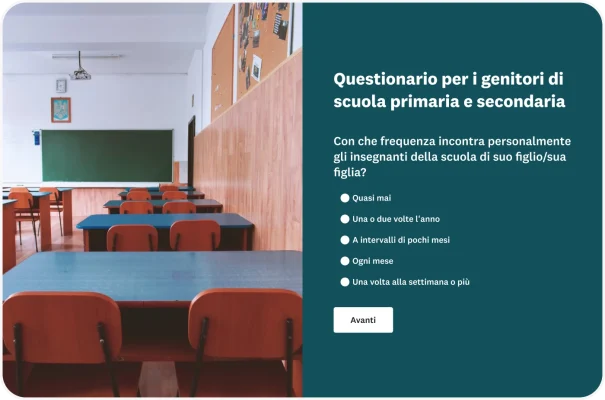Più di 50 domande e modelli di indagine efficaci per ottenere un feedback significativo dai genitori
SurveyMonkey ha collaborato con la Harvard Graduate School of Education per aiutare le scuole a migliorare il coinvolgimento dei genitori.

Il Global Parents' Survey della Varkey Foundation ha evidenziato il desiderio dei genitori di tutto il mondo di un maggiore coinvolgimento nell'istruzione dei propri figli, e le scuole che tengono conto delle opinioni dei genitori riescono a soddisfare meglio queste aspettative.
Oltre ad aiutare gli educatori a prendere decisioni informate, i sondaggi fra i genitori permettono a questi di esprimersi riguardo all'istruzione dei propri figli. Queste indagini sono un ottimo strumento per raccogliere un feedback prezioso, che può migliorare la comunicazione, promuovere il coinvolgimento e in ultima analisi contribuire a rafforzare il rendimento degli studenti.
In questo articolo troverai più di 50 domande e modelli di indagine scritti da esperti per coinvolgere i genitori e migliorare i risultati degli studenti.
Che cosa sono le indagini per i genitori?
I sondaggi condotti fra i genitori sono uno strumento di indagine con cui dirigenti scolastici e insegnanti possono raccogliere il feedback dei genitori riguardo all'istruzione dei propri figli.
Di solito contengono domande relative all'ambiente scolastico, al supporto accademico, alla comunicazione con i docenti e al livello generale di soddisfazione per l'esperienza scolastica. Offrendo ai genitori l'opportunità di esprimere le loro opinioni, la scuola può raccogliere spunti e suggerimenti direttamente dalle persone che hanno un importante impatto sull'educazione degli studenti.
Infatti, come evidenziato da un articolo del 2002 della dottoressa Karen Mapp, "A New Wave of Evidence", il coinvolgimento dei genitori determina un miglioramento del rendimento degli studenti, dei voti nei test standardizzati, delle competenze sociali e delle percentuali di diplomati.
I questionari di indagine destinati ai genitori sono essenziali per comprendere le loro esigenze e preoccupazioni e per capire in che modo la scuola può migliorare nel proprio ruolo di sostegno all'istruzione e al successo degli studenti. Le scuole utilizzano le informazioni raccolte per le seguenti finalità:
- Valutazione dei propri programmi
- Miglioramento delle strategie di comunicazione
- Promozione di un ambiente educativo più inclusivo e collaborativo
Cerchi uno strumento intuitivo per iniziare?
Con il nostro modello di indagine sul coinvolgimento dei genitori potrai raccogliere il feedback dei genitori e migliorare i risultati degli studenti.
Più di 50 domande per i questionari per i genitori
Abbiamo collaborato con il dottor Hunter Gehlbach della Harvard Graduate School of Education per aiutare le scuole primarie e secondarie a porre le domande giuste e assicurarsi quindi che il coinvolgimento dei genitori abbia effetti positivi sull'istruzione.
Il dottor Gehlbach e il suo team hanno applicato un processo rigoroso per sviluppare domande volte a valutare gli ambiti chiave nella relazione scuola-famiglia. Prendendo spunto dalla letteratura accademica, dalle interviste ai genitori, dai gruppi di discussione, dai panel di esperti e dalle prassi migliori per la progettazione delle indagini, il team ha creato il nostro modello di indagine per i genitori che copre i seguenti ambiti fondamentali.
Ecco più di 50 domande che potrai utilizzare per la tua prossima indagine.
Comunicazione scolastica
- Con che frequenza riceve comunicazioni dalla scuola?
- Quale metodo preferisce per ricevere comunicazioni dalla scuola?
- Che tipologie di informazioni ritiene più utili? Selezioni tutte le opzioni applicabili.
- Trova soddisfacente l'attuale livello di comunicazione da parte della scuola?
- Ritiene che le comunicazioni da parte della scuola siano tempestive?
- Ritiene che le informazioni fornite dalla scuola siano chiare?
- Quali eventuali ostacoli incontra nella ricezione delle comunicazioni dalla scuola? Selezioni tutte le opzioni applicabili.
- Quali suggerimenti vorrebbe offrire per migliorare le comunicazioni da parte della scuola?
- Ritiene che la scuola riesca a rispondere alle sue domande e ai suoi dubbi?
Offerta formativa e apprendimento
- Ritiene soddisfacente l'attuale offerta formativa della scuola?
- Ritiene che l'offerta formativa soddisfi le esigenze educative di suo figlio/sua figlia?
- Secondo lei, a quali materie dell'offerta formativa andrebbe dedicata maggiore attenzione?
- Quale valutazione assegnerebbe alla qualità generale dell'insegnamento in questa scuola?
- Ritiene che la scuola riesca a preparare gli studenti a conseguire futuri successi accademici?
- Quali sono, secondo lei, i punti di forza dell'attuale offerta formativa?
- Quali cambiamenti suggerirebbe per migliorare l'offerta formativa?
- Con quale frequenza riceve aggiornamenti sull'andamento di suo figlio/sua figlia?
- Ritiene che la scuola fornisca risorse e sostegni adeguati per l'apprendimento di suo figlio/sua figlia?
- In che misura di sente coinvolto/coinvolta nell'istruzione di suo figlio/sua figlia?
Ambiente scolastico e sicurezza
- Quale valutazione assegnerebbe all'ambiente scolastico in generale?
- Ritiene soddisfacenti le misure di sicurezza attualmente adottate a scuola?
- Quali misure di sicurezza ritiene più efficaci a scuola? Selezioni tutte le opzioni applicabili.
- Ritiene che il personale scolastico sia disponibile a discutere dei dubbi relativi alla sicurezza?
- Quale valutazione assegnerebbe alle comunicazioni della scuola relative alle politiche e agli incidenti riguardanti la sicurezza?
- Ritiene che la scuola sia un ambiente sicuro per suo figlio/sua figlia?
- Ritiene soddisfacente il modo in cui la scuola risponde al bullismo?
- Ritiene che la scuola riesca a gestire i problemi di salute mentale?
- Quali suggerimenti proporrebbe per migliorare l'ambiente scolastico e la sicurezza?
Coinvolgimento dei genitori
- Con quale frequenza comunica con gli insegnanti di suo figlio/sua figlia?
- A quale dei seguenti eventi partecipa di solito? Selezioni tutte le opzioni applicabili.
- Con quale frequenza aiuta suo figlio/sua figlia a svolgere i compiti a casa?
- In che misura di sente coinvolto/coinvolta nell'istruzione di suo figlio/sua figlia?
- Ritiene che il coinvolgimento dei genitori sia importante per il successo scolastico dei figli?
- Ritiene che la scuola offra adeguate opportunità per il coinvolgimento dei genitori?
- Quante ore a settimana dedica allo svolgimento di attività scolastiche con suo figlio/sua figlia?
- Si sente a suo agio nel comunicare con gli insegnanti di suo figlio/sua figlia?
- Con quale frequenza partecipa ai comitati scolastici o alle organizzazioni dei genitori?
Servizi di supporto agli studenti
- In generale, ritiene soddisfacenti i servizi di supporto agli studenti offerti dalla scuola?
- Di quali servizi di supporto agli studenti ha usufruito suo figlio/sua figlia? Selezioni tutte le opzioni applicabili.
- Ritiene che i servizi di consulenza siano efficaci nel sostenere il benessere emotivo e mentale di suo figlio/sua figlia?
- Ritiene che i servizi di tutoraggio forniti dalla scuola siano accessibili?
- Ritiene soddisfacenti i servizi educativi speciali offerti dalla scuola?
- Con quale probabilità consiglierebbe ad altri genitori i servizi di supporto agli studenti offerti dalla scuola?
Insegnanti e personale
- Nel complesso, ritiene soddisfacente la prestazione degli insegnanti della scuola?
- Ritiene che i docenti rispondano efficacemente alle esigenze accademiche di suo figlio/sua figlia?
- Quale valutazione assegnerebbe alla tempestività di risposta del personale scolastico ai suoi dubbi?
- Ritiene che il personale amministrativo della scuola sia disponibile e collaborativo?
- Quali aspetti della prestazione degli insegnanti ritiene più soddisfacenti? Selezioni tutte le opzioni applicabili.
- Ritiene soddisfacenti le iniziative messe in campo dalla scuola per garantire un ambiente sicuro e inclusivo per tutti gli studenti?
Soddisfazione generale
- Nel complesso, ritiene soddisfacente la qualità dell'istruzione fornita?
- Quale valutazione assegnerebbe alla comunicazione tra la scuola e i genitori?
- Ritiene soddisfacenti le strutture e le risorse della scuola?
- Ritiene soddisfacenti le attività extracurricolari offerte?
- Quale valutazione assegnerebbe alla qualità del corpo docente?
- Ritiene soddisfacente il modo in cui la scuola previene il bullismo?
- Qual è, secondo lei, il punto di forza maggiore della scuola?
- Secondo lei, quale ambito necessita di più di miglioramenti?
Pianificazione futura e aspettative
- Quali sono le sue principali preoccupazioni per il futuro di suo figlio/sua figlia? Selezioni tutte le opzioni applicabili.
- Quanto è importante per suo figlio/sua figlia frequentare l'università?
- Che tipo di formazione post diploma preferisce per suo figlio/sua figlia?
- Quali sono le sue aspettative per il percorso professionale di suo figlio/sua figlia?
- Quanta fiducia nutre nel fatto che suo figlio/sua figlia riesca a raggiungere i propri obiettivi futuri?
- Secondo lei, quali sono le competenze più importanti che suo figlio/sua figlia dovrebbe sviluppare per avere successo in futuro? Selezioni tutte le opzioni applicabili.
- In che misura prevede di essere coinvolto/coinvolta nella pianificazione del percorso formativo di suo figlio/sua figlia?
- Con quale probabilità chiederà una consulenza professionale per pianificare il futuro di suo figlio/sua figlia?
Lettura correlata: Le migliori domande di indagine per gli studenti
Modelli per le indagini rivolte ai genitori
I presidi, il personale docente e amministrativo, i consigli scolastici o le organizzazioni di genitori/insegnanti di qualsiasi scuola primaria e secondaria (pubblica, privata, indipendente, paritaria, urbana o rurale) dovrebbero sfruttare lo strumento delle indagini per capire cosa pensano i genitori del loro operato.
Può essere utile anche ottenere un contesto dai risultati delle indagini confrontandoli con quelli di altre scuole e organizzazioni. Trovare un parametro di riferimento per confrontare i dati sul coinvolgimento dei genitori della tua scuola può aiutarti a definire obiettivi perseguibili e a comprendere meglio i punti di forza del tuo istituto nell'interazione scuola-genitori.
Indagine sul coinvolgimento dei genitori

Queste indagini sono ideali per valutare il grado di coinvolgimento dei genitori nella vita scolastica dei propri figli. Servono anche alle scuole per capire se riescono a comunicare con efficacia e per individuare eventuali opportunità di migliorare. Puoi utilizzare il modello di indagine per il coinvolgimento dei genitori per capire quali sono gli ambiti in cui si sentono più coinvolti e quelli in cui, invece, vorrebbero svolgere un ruolo più attivo.
Questionario sul supporto dei genitori
Pensato per capire il tipo di supporto che i genitori hanno bisogno di ricevere dalla scuola, il modello di questionario per il supporto dei genitori serve a scoprire quali risorse e strumenti di assistenza sarebbero utili alle famiglie per supportare meglio l'apprendimento dei propri figli. Include domande sull'orientamento accademico, sul supporto extracurricolare e altro ancora.
Questionario per i genitori di scuola primaria e secondaria

Questo è un questionario di indagine multiuso creato appositamente per le famiglie con figli che frequentano la scuola elementare o media. Il modello di indagine per i genitori di scuola primaria e secondaria permette di raccogliere un feedback sui programmi scolastici, sulla comunicazione con gli insegnanti e sul livello generale di soddisfazione, offrendo così una visione a tutto tondo dell'esperienza dei genitori.
Indagine sul comportamento dei figli
Questo questionario di indagine si focalizza su cosa pensano i genitori del comportamento dei propri figli a casa e a scuola. Il modello di indagine sul comportamento dei figli è uno strumento utilissimo per individuare eventuali preoccupazioni e instaurare una collaborazione tra famiglie ed educatori al fine di gestire tali problemi.
Indagine per la valutazione dell'autoefficacia dei genitori
Questo tipo di indagine aiuta le scuole a valutare il grado di fiducia dei genitori nel sostenere il progresso scolastico dei propri figli. Il modello di indagine per la valutazione dell'autoefficacia dei genitori è particolarmente utile per capire in che ambiti i genitori potrebbero aver bisogno di ulteriori risorse, maggiore preparazione o incoraggiamento.
Indagine sull'idoneità dei programmi scolastici
Questo tipo di indagine serve a capire se i programmi sono in linea con le aspettative dei genitori e le esigenze degli studenti. Il modello di indagine sull'idoneità dei programmi scolastici è uno strumento pratico per individuare eventuali lacune nella programmazione e capire quali miglioramenti introdurre per il futuro.
Indagine sui ruoli e le responsabilità dei genitori

Questo sondaggio esamina il modo in cui i genitori percepiscono il proprio ruolo nell'educazione dei figli. Il modello di indagine sui ruoli e le responsabilità dei genitori aiuta le scuole a definire meglio la collaborazione genitori-insegnanti e chiarire le aspettative di entrambe le parti.
Come creare un sondaggio di indagine per i genitori
Un'indagine ben progettata può fornire un feedback prezioso su qualsiasi aspetto, dalle comunicazioni della scuola al sostegno scolastico. Ma se è progettata in modo incorretto, le percentuali di risposta saranno basse e i dati poco chiari, e non permetterà di capire il punto di vista dei genitori.
I passaggi descritti di seguito sono un'utile guida per creare questionari di indagine mirati, efficaci e facili da completare per i genitori.
Definire gli obiettivi
Prima ancora di valutare le domande da porre o la struttura dell'indagine, è necessario stabilire qual è lo scopo del sondaggio. Considera questo passaggio come la fase iniziale di un articolo di ricerca ben scritto: è il quesito della ricerca.
Che tu voglia ricevere un feedback sulle comunicazioni scolastiche, sui programmi accademici o sul coinvolgimento dei genitori, se avrai definito chiaramente gli obiettivi riuscirai a formulare domande mirate che generano informazioni fruibili.
Scegliere lo strumento di indagine giusto
Probabilmente non accetteresti di rispondere a un questionario scritto a mano su un pezzo di carta. La piattaforma utilizzata per progettare e distribuire i tuoi questionari deve essere affidabile e sostenerne l'importanza.
SurveyMonkey offre strumenti intuitivi per la creazione, l'invio e l'analisi dei sondaggi, fornendo anche modelli di indagine per i genitori scritti da esperti e progettati appositamente per le scuole. Con il nostro strumento di indagine basato sull'IA, inoltre, è possibile creare indagini e analizzare risultati in modo professionale.
Formulare domande chiare e pertinenti
Considera la struttura a cinque paragrafi dei saggi, che prevede l'enunciazione iniziale della tesi, seguita da tre paragrafi di supporto e infine un riepilogo conclusivo. La chiave per scrivere un saggio perfetto sono proprio i tre paragrafi di supporto, che devono essere chiari, pertinenti ed efficaci nel rafforzare l'argomentazione presentata nella tesi.
Perché le indagini per i genitori siano efficaci, le domande devono essere in linea con l'obiettivo della ricerca. Quindi poni domande semplici, specifiche e ben mirate. Utilizza sia domande a scelta multipla che a scala di valutazione e a risposta aperta, per ottenere un feedback quantitativo e qualitativo.
Inoltre, quando scrivi le domande tieni in considerazione il tuo pubblico. Evita formulazioni tendenziose o eccessivamente complesse, perché possono comportare bias nell'indagine o questionari non completati.
Testare l'indagine
Prima di distribuire il questionario all'intera comunità di genitori, è fondamentale condurre un test preliminare su un piccolo gruppo rappresentativo.
Questa fase pilota, simile a una revisione tra pari in classe, permette di individuare eventuali ambiguità e di accertarsi che il linguaggio utilizzato sia chiaro, conciso e comprensibile da tutti i rispondenti.
Il test è utile anche per localizzare eventuali problemi di usabilità, per esempio problemi tecnici o di navigazione, in modo da garantire ai genitori un'esperienza fluida e priva di difficoltà.
Questo ciclo di feedback iniziale è preziosissimo per perfezionare lo strumento di indagine, migliorandone l'efficacia complessiva e massimizzando la qualità e l'affidabilità dei dati raccolti dalla popolazione più ampia di genitori.
Distribuire i questionari
Condividi i questionari di indagine attraverso i canali utilizzati regolarmente dai genitori.
Per esempio, se di solito invii all'email dei genitori il calendario della mensa, questo stesso canale potrebbe essere adatto anche per distribuire il questionario, perché è lì che i genitori si aspettano di ricevere le comunicazioni della scuola. Oppure gli insegnanti potrebbero incorporare un'indagine nel loro canale di comunicazione principale.
È bene comunicare in modo chiaro lo scopo e l'importanza del sondaggio per incoraggiare la partecipazione.
Analizzare i risultati e agire di conseguenza
È importante che il feedback ricevuto dal sondaggio venga utilizzato come base per azioni concrete. Esamina i dati per identificare tendenze, preoccupazioni e opportunità di miglioramento.
Potresti scoprire che un numero crescente di genitori desidera avere informazioni sui programmi di tutoraggio. Oppure che i genitori non sanno come offrire supporto all'educazione dei propri figli a casa.
Sfrutta le informazioni per migliorare i programmi scolastici e l'offerta formativa, e comunica quali azioni intendi intraprendere in base al feedback ricevuto. Le famiglie vorranno essere informate sui cambiamenti che riguardano l'ambiente educativo dei figli e vorranno capire come poterli assistere al meglio in queste transizioni.
Lettura correlata: Analisi comparativa delle prestazioni della scuola
Suggerimenti per condurre le indagini per i genitori
Condurre con efficacia le indagini per i genitori non vuol dire soltanto inviare un elenco di domande. Per raccogliere un feedback rilevante, è necessaria una pianificazione accurata, una comunicazione chiara e un ambiente che favorisca risposte sincere.
I suggerimenti che seguono ti aiuteranno a promuovere la partecipazione, migliorare la qualità delle risposte e ottenere il massimo dalle informazioni raccolte.
Includi informazioni demografiche
Raccogli dati relativi al background dei genitori, come la loro età, il reddito familiare e il loro livello di istruzione, per individuare eventuali tendenze. Porre ai genitori domande demografiche può essere utile per personalizzare i programmi, migliorare la comunicazione e rafforzare le strategie di coinvolgimento.
Poni domande chiare e concise
Formula domande chiare che affrontino in modo completo gli aspetti rilevanti dell'esperienza scolastica e permettano di ottenere risposte fruibili. È opportuno includere domande sulla comunicazione, sui servizi di supporto e sull'ambiente scolastico in generale.
Assicurati che le domande incoraggino una riflessione attenta e coprano aspetti quali il coinvolgimento degli studenti, le risorse per la salute mentale e il coinvolgimento dei genitori, per facilitare una comprensione olistica del percorso formativo.
Presenta sia domande a scelta multipla che a risposta aperta
I dati quantitativi raccontano solo metà della storia. Supponiamo che il feedback raccolto indichi che la maggior parte dei genitori ritiene inaccessibili i servizi di tutoraggio offerti dalla scuola. Perché? Con una domanda a risposta aperta è possibile capire il motivo per cui i genitori non riescono ad accedere al tutoraggio per i propri figli.
Quindi, una domanda a scelta multipla chiederà: "Ritiene che i servizi di tutoraggio forniti dalla scuola siano accessibili?" e per approfondire la risposta seguirà una domanda aperta del tipo: "Ci parli della sua esperienza relativa all'accesso ai servizi di tutoraggio".
Potresti scoprire che i genitori non sanno come funziona l'iscrizione al tutoraggio o potrebbero desiderare orari di più ampi.
Condividi i risultati e spiega come utilizzerai il feedback
L'istruzione è fondamentalmente un'impresa collaborativa, spesso paragonata a uno sport di squadra, in cui insegnanti, genitori e studenti collaborano per ottenere i risultati migliori.
È fondamentale presentare ai genitori i risultati del sondaggio in maniera chiara e accessibile. La trasparenza li aiuterà a comprendere lo stato attuale dell'ambiente in classe, gli eventuali cambiamenti previsti nell'offerta formativa o nei metodi di insegnamento, e le strategie specifiche che possono applicare per supportare il percorso formativo dei propri figli.
Tenendo i genitori informati e coinvolti, puoi favorire una collaborazione più solida, che rafforza il rendimento degli studenti e il coinvolgimento generale della comunità scolastica.
Assicura l'anonimato per incoraggiare la sincerità nelle risposte
È importante prendere atto del fatto che, purtroppo, alcuni genitori potrebbero avere delle remore nell'esprimere opinioni critiche per paura di possibili ritorsioni sui propri figli. Una paura che potrebbe derivare da esperienze passate, dalla percezione di dinamiche di potere o da una mancanza di fiducia nel sistema. Per gestire questi timori e incoraggiare una comunicazione sincera, è essenziale rassicurare i genitori sul fatto che il loro feedback è anonimo.
Nei questionari anonimi i dati di identificazione personale non vengono raccolti o collegati con le risposte. Sottolineando il carattere anonimo del questionario e comunicando il modo in cui le risposte saranno utilizzate per migliorare l'ambiente scolastico, i genitori si sentiranno più a loro agio nell'esprimere le loro opinioni senza temere conseguenze negative sui figli.
Lettura correlata: Migliorare il coinvolgimento a scuola con i sondaggi per gli studenti
Crea le tue indagini con SurveyMonkey
Creare indagini rilevanti per i genitori e tutori non deve essere per forza complicato. Grazie ai nostri modelli progettati da esperti, i dirigenti scolastici possono creare velocemente dei sondaggi per i genitori utili per supportare gli obiettivi accademici, migliorare il benessere in classe e creare uno spirito di squadra tra insegnanti e genitori.
Questi strumenti facilitano la raccolta del feedback e l'analisi dei risultati, e promuovono un cambiamento positivo nella comunità scolastica. Vuoi cominciare? Esplora SurveyMonkey per l'istruzione per creare indagini efficaci e sostenere il successo degli studenti.
Scopri come SurveyMonkey può stimolare la tua curiosità
Scopri altre risorse

Soluzioni per ogni ruolo
SurveyMonkey può aiutarti a lavorare meglio. Scopri come migliorare il tuo impatto con strategie, prodotti ed esperienze vincenti.

Raccogli feedback utile e fruibile con i moduli di valutazione online
Crea e personalizza moduli di valutazione online. Raccogli un feedback strutturato, valuta le prestazioni e prendi decisioni informate con facilità.

Modello per moduli di iscrizione alla scuola dell'infanzia
Snellisci la registrazione con il nostro modulo di iscrizione alla scuola dell'infanzia, personalizzabile con il generatore di moduli SurveyMonkey.

Modello per la registrazione di ex studenti
Rimani in contatto utilizzando il nostro modello per la registrazione di ex studenti, personalizzabile con il nostro intuitivo generatore di moduli.